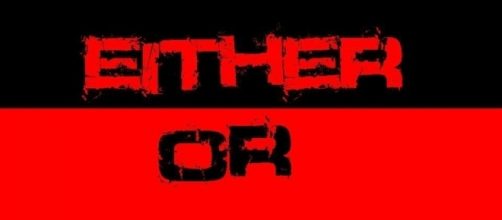Frank Bruni is a clever columnist for the New York Times, and if you search religion now, you will find the following "breaking news" reference at the top of the list, "A Prayer for Donald Trump."
Bruni writes, "Given the mess that he’s in and the martyrdom that he hallucinates, it’s only fitting that Donald Trump would turn toward God." Trump is traveling today on a trip which includes meeting Pope Francis.
Touring Abrahamic religions
Bruni's column evokes an error that has hobbled history. It is the tendency to either-or thinking. This stems from the failure to admit ethics and conscience into the thought process.
The columnist says Trump's trip is a survey of religions we might call Abrahamic -- the progeny of the Biblical Abraham. There are three of them: Islam (Saudi Arabia), Judaism (Israel) and then Christianity in the person of Pope Francis at the Vatican. Francis is about as ecumenical a person as you will find in the still-divided world of Christendom.
My way or the highway
Bruni's binary statements include this about Trump and the pope: "One of them is splenetic. The other is ascetic. One sins. The other redeems." Other Bruni binaries include sacred and profane, Trump and godliness, divorce and cleanliness. Abrahamic religions are promoters of the binary view -- heaven and hell, good and evil, war and peace, the city of God and the city of man.
Kierkegaard and Niebuhr
Kierkegaard wrote Either Or, collapsing things into a choice between two sides. The American theologian Reinhold Niebuhr wrote what Cornel West has called as the most profound statement of theological truth penned in recent times, "Moral Man and Immoral Society."
West hails Niebuhr tragic vision. But the notion that man is moral and society is immoral is not correct. It would require several articles to suggest why, but the outline is simple.
Society is us
Society is the aggregate of individuals. The only people who move history are human beings, The only thing that makes human beings moral is their willingness to think beyond binary either-or and apply universal values like tolerance, helpfulness, and democracy to their actual thinking.
Values drive history. Society has no mind. Society is not worse than we are. It is the mirror of our individual mentality.
The stasis legacy
Saul Alinsky once noted that if you think about means and ends all the time you wind up on your end without any means. Stasis has been the legacy of churches hobbled by binary theology. If religion is the motivator of our most significant acts, it needs a theology that sees the world as one of possibility, not an unalloyed tragedy.


